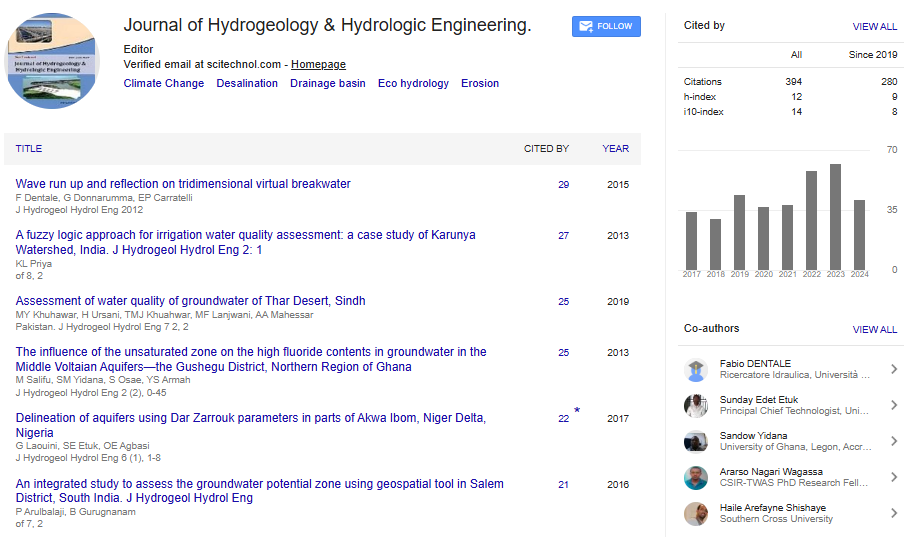Opinion Article, J Hydrogeol Hydrol Eng Vol: 12 Issue: 3
The Sustaining Futures through Eco-Hydrology Nature Harmonious Flow
Natalie Nelson*
Department of Environment, Central Queensland University, Queensland, Australia
*Corresponding Author: Natalie Nelson
Department of Environment
Central Queensland University
Queensland, Australia
E-mail: nelsonn44@gmail.com
Received date: 15 May, 2023, Manuscript No. JHHE-23-107562;
Editor assigned date: 17 May, 2023, PreQC No. JHHE-23-107562 (PQ);
Reviewed date: 31 May, 2023, QC No. JHHE-23-107562;
Revised date: 08 June, 2023, Manuscript No. JHHE-23-107562 (R);
Published date: 16 June, 2023, DOI: 10.4172/2325-9647.1000273
Citation: Nelson N (2023) The Sustaining Futures through Eco-Hydrology Nature Harmonious Flow. J Hydrogeol Hydrol Eng 12:3.
Description
Eco-hydrology is an interdisciplinary field that seeks to understand the intricate relationship between ecological systems and hydrological processes. It emphasizes the precarious link between water resources, biodiversity, and environmental sustainability. As human activities continue to exert pressure on natural ecosystems, the study and application of eco-hydrology have become paramount in our quest for a harmonious coexistence with nature. This article delves into the principles, significance, and practical applications of eco-hydrology in ensuring a thriving and resilient planet.
Understanding eco-hydrology
Eco-hydrology goes beyond traditional hydrological studies, which focus solely on water quantity and movement. It takes into account the intricate web of interactions between living organisms and the hydrological cycle. By examining the dynamic relationships between plants, animals, microorganisms, and water systems, eco-hydrologists gain insights into how changes in one component can influence the entire ecosystem.
The significance of eco-hydrology
Ecosystem health and biodiversity: Eco-hydrology plays a vital role in maintaining ecosystem health and preserving biodiversity. Wetlands, for example, serve as natural water purification systems and essential habitats for countless species. Understanding their hydrological functions is essential for their conservation.
Climate change mitigation and adaptation: Climate change profoundly impacts hydrological cycles, leading to more frequent and intense droughts, floods, and disruptions to ecosystems. Eco hydrology provides valuable information to design adaptive strategies and mitigate the effects of climate change on water resources and natural environments.
Sustainable water management: Properly managed watersheds and ecosystems are fundamental for sustainable water management. Eco-hydrological principles help guide policymakers and water resource managers to make informed decisions that balance human needs with environmental conservation.
Applying eco-hydrology in practice
Restoring riparian zones: Riparian zones along rivers and streams are precarious for maintaining water quality and supporting biodiversity. Eco-hydrology is applied in the restoration of these areas, employing techniques like re-vegetation and bank stabilization to improve ecological health.
Green infrastructure: Eco-hydrological principles can be integrated into urban planning by incorporating green infrastructure, such as green roofs, rain gardens, and permeable pavements. These interventions mimic natural hydrological processes, reducing runoff and improving water quality.
Climate-smart agriculture: Eco-hydrology is employed in designing climate-smart agricultural practices. This involves optimizing irrigation techniques, enhancing soil water retention, and promoting agroforestry to improve the resilience of agricultural systems to changing hydrological patterns.
Challenges and future outlook
Despite the growing awareness of eco-hydrology's importance, several challenges exist in its widespread implementation. These challenges include data scarcity, the complexity of ecological interactions, and the need for collaboration among various disciplines.
Looking ahead, the future of eco-hydrology holds great promise. Advances in technology and data collection methodologies are improving our understanding of ecosystem dynamics and hydrological processes. Integrating traditional knowledge with modern science can further enrich our approach to managing water resources sustainably.
Conclusion
Eco-hydrology provides a holistic perspective that brings together the realms of ecology and hydrology. By recognizing the interdependence of living organisms and water systems, we can work towards preserving biodiversity, mitigating climate change impacts, and fostering sustainable water management practices. Embracing the principles of eco-hydrology will undoubtedly guide us towards a more harmonious and prosperous coexistence with the natural world.
 Spanish
Spanish  Chinese
Chinese  Russian
Russian  German
German  French
French  Japanese
Japanese  Portuguese
Portuguese  Hindi
Hindi 
